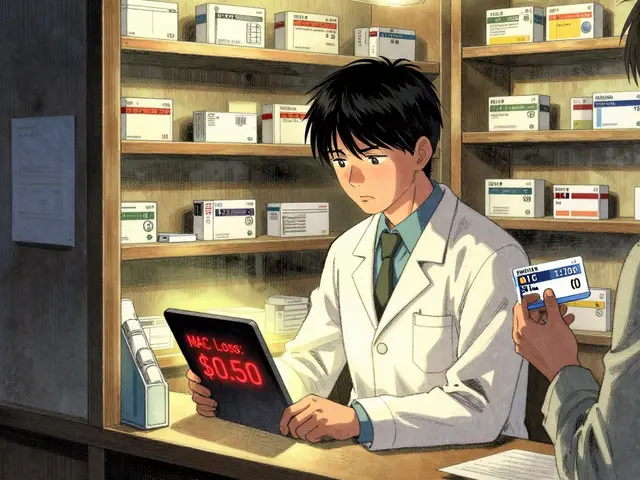You might be surprised to learn that Effexor XR, a prescription that’s been around since the late ’90s, is still one of the most commonly prescribed medications for anxiety and depression in the U.S. In 2023 alone, over 11 million prescriptions were written for it. But with so many choices these days—including newer meds, therapy apps, and TikTok-recommended hacks—you’ve probably wondered: why Effexor XR? Does it actually work? What’s the deal with the side effects people talk about? And is it right for you or someone you care about?
What Is Effexor XR? The Science, Not the Hype
Effexor XR is the brand name for venlafaxine extended-release. It’s both an SSNRI and, to be honest, a bit of a chemistry nerd’s favorite. Yes, a selective serotonin and norepinephrine reuptake inhibitor. That mouthful matters, since it tells you how the medicine changes your brain chemistry. Instead of just focusing on serotonin, like SSRIs (think Prozac or Zoloft), Effexor XR hits both serotonin and norepinephrine—the duo behind motivation, mood, and how you handle stress.
Those chemicals aren’t just science-speak; they literally play the starring role in how you get out of bed, focus at work, or enjoy dinner with friends. Effexor XR gradually ramps up the amount of those brain transmitters floating around. The XR part? "Extended release." That means one pill a day can last 24 hours, keeping your mood steadier and saving you from scrambling for a second dose at lunch.
The FDA approved the extended-release version—Effexor XR—in 1997, after strong evidence from clinical trials. Early studies showed, for example, that around 60% of people with major depressive disorder saw clear improvement, compared to 35% on placebo. And unlike some first-gen antidepressants, Effexor XR doesn’t usually come with a long list of food restrictions.
| Approval Year | Type | Main Uses |
|---|---|---|
| 1997 | SSNRI | Depression, Anxiety, Panic Disorder, Social Anxiety |
So who gets prescribed Effexor XR? If you’re struggling with depression, generalized anxiety disorder, panic disorder, or social anxiety, your doctor might bring it up. Some providers also use it off-label for things like hot flashes in menopause, but that’s another can of worms. And for those who haven’t had relief with the classic SSRIs, Effexor XR is often the next stop on the train.
Effexor XR in Real Life: What to Expect (Side Effects, Dosage, and More)
Starting any new med can feel like opening a mystery box—you never quite know what to expect. Effexor XR is no exception. Psychiatrists typically recommend starting low and going slow. Most people begin at 37.5 mg per day, then move up to 75 mg, and sometimes—after a few weeks or months—up to 225 mg. The max FDA-approved dose for depression is 225 mg daily, but some doctors use lower or split dosing for anxiety.
So what happens in your first month? For many, the boost in energy and mood comes within 2-4 weeks—often sooner for anxiety. But the side effects can be a real rollercoaster. The big five to watch for:
- Effexor XR side effects like nausea—especially for the first week or two. (Hint: tons of folks swear by taking it with food in the morning!)
- Sweating, even when you’re barely moving. It’s annoying, but sometimes it fades.
- Dizziness when you stand up quickly. Stay hydrated and rise slowly until your body adjusts.
- Mild sexual side effects, like lower libido or difficulty reaching orgasm—but rates are lower than many other antidepressants.
- Trouble sleeping. Some feel energized; for others, insomnia is a dealbreaker. If you get wired, try taking it earlier in your day.
The most talked-about issue? Withdrawal if you stop too quickly. Effexor XR wins the award for "most stubborn brain zaps" (those electric zings in your head) when people miss doses or quit cold turkey. Always taper under doctor supervision, ideally shaving off a little at a time every week.
One interesting study out of Canada found that folks who paired Effexor XR with therapy reported better results than those on the pill alone—think of it as teamwork for your brain. Food doesn’t really mess with absorption for the XR version, so you have flexibility. Drinking alcohol, though, can increase side effects, so moderation is key.
Another cool fact: Effexor XR tends to help with physical symptoms connected to anxiety—racing heart, muscle tension—more than some other options. That’s thanks to its norepinephrine boost.

Weighing the Benefits: How Effexor XR Stacks Up to Other Antidepressants
The pharmacy shelf looks pretty crowded, right? Prozac, Lexapro, Cymbalta, Wellbutrin… it’s a lot. So why might your doctor pick Effexor XR? Here’s the lowdown:
- It’s one of the few antidepressants proven in big studies to work for both anxiety disorders and depression—without bouncing between different meds.
- Compared with some SSRIs, Effexor XR kicks in a bit faster for anxiety relief, though depression changes often take a few weeks.
- It’s not sedating for most, which is a plus if you need to focus at work or school.
- Some prefer it after other antidepressants have failed—especially if they’re fighting both low mood and serious anxiety.
But there are trade-offs. People over 65 or with high blood pressure need close monitoring (Effexor XR can nudge blood pressure higher, especially at large doses). In rare cases, it can trigger serotonin syndrome if combined with certain migraine meds, illegal drugs, or other antidepressants—so always give your doc the full scoop on everything you’re taking.
One frequently cited stat: About 30% of people who respond to Effexor XR say it’s the first antidepressant that ever truly helped, especially if they struggle with physical agitation or nervous energy on other meds. That’s significant, considering how hard it can be to find the right fit. It’s also covered as a generic—venlafaxine XR—by most insurance plans in the U.S., making it much more affordable than some brand-only meds.
Here’s a quick at-a-glance table comparing Effexor XR with a few common meds:
| Medication | Type | Main Uses | Known Issues |
|---|---|---|---|
| Effexor XR | SSNRI | Depression, Anxiety, Panic Disorder | Withdrawal symptoms, sweating, blood pressure |
| Lexapro | SSRI | Depression, Anxiety | Sexual side effects, weight gain |
| Wellbutrin | NDRI | Depression, Smoking cessation | Insomnia, appetite loss, seizures (rare) |
| Cymbalta | SSNRI | Depression, Anxiety, Pain | Dry mouth, nausea, sweating |
Tips for Taking Effexor XR: Making the Most of Your Prescription
Pills aren’t magic. But there are dozens of ways to give yourself the best odds when starting Effexor XR. Here’s what people who’ve been on it wish they’d known from the start:
- Stick to a routine. Same time, same way—mornings with breakfast work great for most.
- Swallow the capsule whole. Don’t crush, chew, or sprinkle it on your yogurt—XR means it’s built to release slowly.
- Track your symptoms. Keep a notebook or use an app to jot down side effects, mood changes, and physical symptoms—they might sneak up on you, especially in the first month.
- Hydrate like it’s your job. Effexor XR can dry you out—think of water as another daily supplement.
- If you miss a dose, take it within a few hours—otherwise, skip it and go back to your usual schedule. Doubling up can backfire.
- Feeling sweaty or wired? Try cooler clothes and cut back on caffeine. Keep your doctor posted if symptoms get worse, not better.
- Don’t quit abruptly—even if you’re feeling better. Tapering down should always be supervised. Some people use pill splitters, doctor-written schedules, or switch to tablets when cutting down slow.
- Be open with your prescriber about everything—herbal supplements, other meds, even new over-the-counter vitamins. Interactions are more common than you’d think, especially with things like St. John’s Wort or migraine drugs.
And here’s something not everyone tells you: withdrawal (or “discontinuation syndrome”) is way less intense if you miss just one or two doses accidentally, rather than going cold turkey for several days. Still, no fun—so set a reminder on your phone or recruit a friend to remind you if you’re forgetful.
Another smart tip: if cost is a concern, ask for the generic. Venlafaxine XR is identical, minus the brand price tag. And always check which pharmacy discounts or insurance copays are available in your area—some prices are shockingly high, while others dip as low as $10 a month.

What Research Says and Real People Share: Effexor XR Stories and Stats
It’s one thing to read stats from journals and another to hear what real people experience. On Reddit and forums, personal Effexor XR stories are everywhere. Some say it’s a total game-changer: more energy, hope returning, anxiety dialing down to background noise. Others admit the first couple weeks were rough, with nausea that felt endless and sleep thrown off. But after sticking with it? Many feel more stable than they have in years.
According to a 2022 review published in the Journal of Clinical Psychiatry, Effexor XR has response rates of about 60% in people with depression—meaning visible symptom relief—compared to only 35% on placebo. For generalized anxiety disorder, response rates hover around 50%, which matches or beats several other first-line options. If you combine medication with regular talk therapy, these numbers can jump 10–15 percentage points, according to data from the National Association for Mental Illness (NAMI).
| Condition Treated | Percentage Helped by Effexor XR | Placebo |
|---|---|---|
| Major Depression | 60% | 35% |
| Anxiety Disorder | 50% | 30% |
One surprising finding is that people with physical symptoms of anxiety—racing heart, headaches, muscle tension—are more apt to get relief from Effexor XR than someone whose anxiety is mostly just mental. That’s really good to know when you and your doc are weighing your options.
Of course, no pill is a miracle. There are reports of weight gain after long-term use, though surveys suggest it’s less than with paroxetine or mirtazapine. A tiny number of users report increased blood pressure, so if you have hypertension, regular checks make sense. And while horror stories about withdrawal are all over the internet, most users report that slow, careful tapering (sometimes over 3–6 months) makes quitting a lot easier.
If you ever feel overwhelmed with side effects or need emotional backup, groups like PsychCentral or the Anxiety and Depression Association of America (ADAA) offer real-world tips and support—sometimes exactly what you need to power through the tough days.
Final cool fact: Effexor XR has one of the highest "patient loyalty" rates. People who respond well tend to stick with it for years, rather than bouncing from one med to another. That says something solid about the long-term results—not just the first splash of hope.






Nina Vera
July 18, 2025 AT 13:51Wow, Effexor XR, huh? I’ve heard so many stories about this drug, both good and bad. It’s like a rollercoaster ride for mental health—some people swear by it, while others just want to throw it in the trash. Honestly, I’m kind of on the fence because anxiety and depression don’t play fair, and what works wonders for one person might just wreck another.
For me and my close friends who’ve tried it, the benefits can kick in after a few weeks, which is honestly a lifetime when you’re waiting for relief. But then the side effects can be a nightmare! We’re talking nausea, dizziness, and sometimes that horrible feeling of impending doom that you can’t shake off.
Has anyone else experienced weird withdrawal symptoms when trying to stop? I mean, I get that it’s a powerful medication but should quitting really feel like you’re coming off a rollercoaster drop with no brakes?
I’m curious about the dosage part too because it looks like doctors have to play a guessing game a lot of times to find the right balance.
Also, any tips for managing those awful side effects? Because honestly, that’s the biggest deal-breaker I keep hearing about. Spill the tea, y’all.
Lindsey Bollig
July 19, 2025 AT 13:51Hey Nina, I totally get where you're coming from. Effexor XR does have a notoriously tricky side effect profile. From a more practical standpoint, the first couple of weeks can feel rough, but what’s crucial is not to stop the medication abruptly. Tapering off slowly under medical guidance is a must to avoid the nasty withdrawal symptoms you mentioned.
Also, starting on a low dose and gradually increasing it can help your body adapt better. Many patients find it helpful to set a routine—taking the meds at the same time every day with food might reduce the nausea and dizziness.
And hydration! It sounds basic, but it really helps with those woozy feelings. Plus, talking to your doctor about any new or worsening side effects is key. They can adjust the dose or suggest adjunct therapies.
Remember, medication is only one part of managing anxiety and depression. Therapy, lifestyle changes, and support systems matter just as much.
Michael Weber
July 20, 2025 AT 13:51Honestly, I find it fascinating how we humans throw ourselves on chemicals as if they’re some kind of magic bullet for existential dread. Effexor XR? Sure, it’s effective for some, but it’s really a feedback loop hijacker, messing with neurochemistry in ways that might bring relief or just trade one set of problems for another.
This isn’t a panacea, folks. It’s a pharmaceutical concoction that dampens your emotional range, sometimes leaving you feeling hollow rather than hopeful.
But let’s not kid ourselves—sometimes that numbness is what some need to get through the day. It’s a complicated dance between relief and loss of self.
Anyone else feel like they’ve lost a piece of their authentic self while on this?
I question the wisdom of over-prescribing these medications without a broader philosophical conversation about what it means to be human and suffer.
Sierra Bagstad
July 21, 2025 AT 13:51Completely agree with the idea that Effexor XR isn't a cure-all. The medical community tends to focus on symptom reduction, which is great, but sometimes that means ignoring the bigger picture of mental wellness and individual variability.
One thing to note is that the dosage needs to be personalized because what works for one might be too much or too little for another. Typical starting doses are moderate, and your doctor usually adjusts based on response and tolerability.
About side effects, they are quite common at first but tend to subside after a few weeks as your body adjusts. Still, it’s critical to monitor how you feel because persistent side effects might mean it’s not the right medication for you.
And yes, withdrawal symptoms can be intense – tapering is non-negotiable here. It’s also worth mentioning that combining medication with psychotherapy tends to offer better outcomes overall.
Jillian Bell
July 22, 2025 AT 13:51Guys, have you ever stopped and thought about the big pharma influence behind these meds like Effexor XR? It’s all about pushing pills, pushing profits, and less about people’s actual mental health. There’s a whole system designed to keep us dependent and medicated rather than healed.
Depression and anxiety are literally cash cows, and then this medication package, while seeming helpful, has its own set of hidden agendas. Researching deeper, you find a mess of conflicts of interest and rush approvals.
Also, the way side effects are downplayed is disturbing. People experiencing severe withdrawal symptoms and even worsening depression are often ignored or told to “just hold on.”
It’s crucial to stay informed and not blindly trust the system. Anyone else feel like we’re pawns in a massive pharmaceutical chess game?
Evelyn XCII
July 23, 2025 AT 16:38Look, I’ve tried Effexor XR, and let me just say—it’s like waking up in a fog that never really lifts. Sure, it helps with anxiety and depression on paper, but the daily side effects feel like having a personal hell you carry around in your head.
Does anyone else find it a bit ironic that a drug made to make you feel better literally makes you feel worse at times? The nausea, the shakes, the weird electric shock sensations—what kind of drug has side effects that feel like cyberpunk torture?
And don’t get me started on the withdrawal. It’s like being trapped in a bugged software loop where every attempt to exit sends you crashing.
Still, I guess some people manage to get the benefits without all the drama, so maybe it’s just a luck of the draw?
If you’re starting Effexor XR, have a support system and brace yourself for possible rough patches, seriously.
Daniel Buchanan
July 24, 2025 AT 19:25Hey everyone — I just wanna add that from a clinical perspective, Effexor XR is part of the SNRI class, which means it targets serotonin and norepinephrine. This dual action can be really beneficial for some folks who don’t respond to SSRIs alone.
Dosage usually starts at 37.5 mg or 75 mg daily, and can go up to 225 mg depending on patient response and tolerability. But again, it’s all about careful titration.
Withdrawal symptoms are common if the med is stopped suddenly, so tapering is always recommended. These symptoms can include dizziness, irritability, and flu-like feelings, so patient education before starting is paramount.
Side effects like increased blood pressure should also be monitored especially in long-term use. Always work closely with your healthcare provider to tailor the treatment for your needs.
Lena Williams
July 25, 2025 AT 22:11Just thinking out loud here, but has anyone noticed how balancing mental health meds feels like walking a tightrope? You try to find that sweet spot where the meds help without turning you into a zombie or making you feel crazy in a different way.
I’m really interested in tips for coping with side effects beyond just medicine adjustments—like lifestyle hacks, mindfulness tricks, or even nutritional support. Anyone have personal experience with this?
Also, it would be great to know the typical timeline for noticing both benefits and side effects on Effexor XR. I often feel like I’m stuck in this limbo of waiting but unsure if it’s the med working or just placebo.
And on that note, how do you differentiate between what’s depression/anxiety symptoms and what’s side effect symptoms? It feels like a fine line that’s hard to parse.
Ben Lee
July 27, 2025 AT 00:58Lena, those are really great questions. Living with depression and anxiety, it’s often challenging to separate out side effects from the illness itself. One strategy is consistent symptom journaling before and after starting the medication to track changes objectively.
Another key point is giving it enough time — generally around 4 to 6 weeks — to gauge how the drug is truly working. Early side effects usually subside within this period, but if they persist, you should definitely consult your doctor.
Additionally, combining Effexor XR with cognitive behavioral therapy or mindfulness practices can enhance overall treatment success and provide tools to manage side effects mentally and emotionally.
Just remember that everyone's mental health journey is unique, and communicating openly with your healthcare provider is crucial to finding the best approach.
Blake Marshall
July 28, 2025 AT 03:45For what it’s worth, I’ve been on Effexor XR for a while. The dosage was a mess to figure out at first, but patience paid off. I started low and moved up, as advised, and things did improve quite a bit.
That said, the side effects, man... they really do bite. Headaches, dry mouth, and those random dizzy spells made me question whether this was actually helping me or just making life noisier.
But I remind myself that anxiety and depression suck enough without medication making it worse, so tolerating side effects for a while was worth it.
Anyone else find that having a daily routine helps manage the impact of side effects? I swear, structure and knowing what to expect each day play a huge part.
Alan Kogosowski
July 29, 2025 AT 06:31I appreciate all these insights, truly. Coming from the UK, I’ve seen my fair share of patients on Effexor XR. One thing to emphasize is the importance of psychological support alongside pharmacotherapy.
The medication can alleviate chemical imbalances, but having a support system, whether it’s therapy groups or individual counselling, greatly improves long-term outcomes.
We shouldn’t forget that medications like Effexor XR are tools, not solutions in themselves. Responsible use involves ongoing assessment and adapting treatments as needed.
Has anyone here accessed therapy while on Effexor XR? How did it influence your experience with the medication?